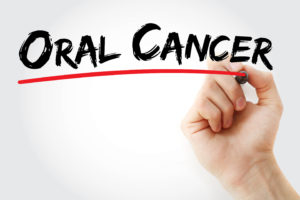 Did you know that oral cancer rates are on the rise? According to the independent nonprofit FAIR Health, health insurance claims for oral cancer skyrocketed by 61% in the U.S. from 2011 to 2015. Detecting oral cancer is the first step to beating the deadly disease. Do you know the symptoms? Your dentist does. April is Oral Cancer Awareness Month, so there is no better time than now to learn how an oral cancer screening in The Colony can help you detect and overcome oral cancer.
Did you know that oral cancer rates are on the rise? According to the independent nonprofit FAIR Health, health insurance claims for oral cancer skyrocketed by 61% in the U.S. from 2011 to 2015. Detecting oral cancer is the first step to beating the deadly disease. Do you know the symptoms? Your dentist does. April is Oral Cancer Awareness Month, so there is no better time than now to learn how an oral cancer screening in The Colony can help you detect and overcome oral cancer.
What is Oral Cancer?
Oral cancer refers to various forms of cancer that occur in the mouth and part of the throat – including the lips, gums, tongue, the inner lining of the mouth, tonsils, esophagus and middle of the throat. Here are some fast facts about oral cancer, as reported by the National Institutes of Health:
- Nearly 100,000 Americans are currently living with oral cancer
- Approximately 37,000 men and women will be newly diagnosed this year
- Approximately 8,000 Americans die of oral cancer each year
3 Risk Factors of Oral Cancer
Scientists still do not know exactly what triggers the DNA changes that lead to oral cancer. However, risk factors that can increase your chances of developing the disease include:
- Smoking or chewing tobacco
- Excessive alcohol consumption
- Infection with the human papilloma virus (HPV), which can be contracted through sexual contact
A Dentist’s Role in Fighting Oral Cancer
Detecting oral cancer before it has had a chance to develop and spread is critical to successfully treating the disease. Early signs and symptoms of oral cancer include:
- Red or white patches on the lining of the mouth
- Unexplained lumps in the mouth or neck
- Persistent, unexplained mouth pain or numbness
- Mouth ulcers that do not heal quickly
- Ear pain without any loss of hearing
- The sensation of something stuck in the throat
- Changes in speech (e.g., developing a lisp)
Your dentist will look for these symptoms when performing an oral cancer screening as part of your routine dental checkup. An oral cancer screening typically includes:
- Visual examination inside the mouth for signs of oral cancer
- Manual examination for unusual bumps and lumps on the neck, face and head
- Conversation about exposure to oral cancer risk factors (e.g., tobacco use)
- Conversation to help identify nonvisible symptoms of oral cancer (e.g., sore throat)
How Often Should I See a Dentist?
The American Dental Association recommends seeing a dentist every six months for a routine dental checkup and oral cancer screening. A lot can change in your mouth in a short amount of time, which is why visiting your dentist regularly is so important!
Remember: early detection of oral cancer is key to overcoming the deadly disease. If you have not seen a dentist in The Colony for many months (or years!), pick up the phone and call him or her today.
About the Author
An active member of the Texas Dental Association, Dr. Austin Amos enjoys helping his patients in The Colony, Texas achieve and maintain healthy smiles. The Plano native conducts an oral cancer screening as part of every routine dental checkup at Ridgepointe Dental. Patients old and new can contact Dr. Amos via the Ridgepointe Dental website or by calling 972-625-4746.
